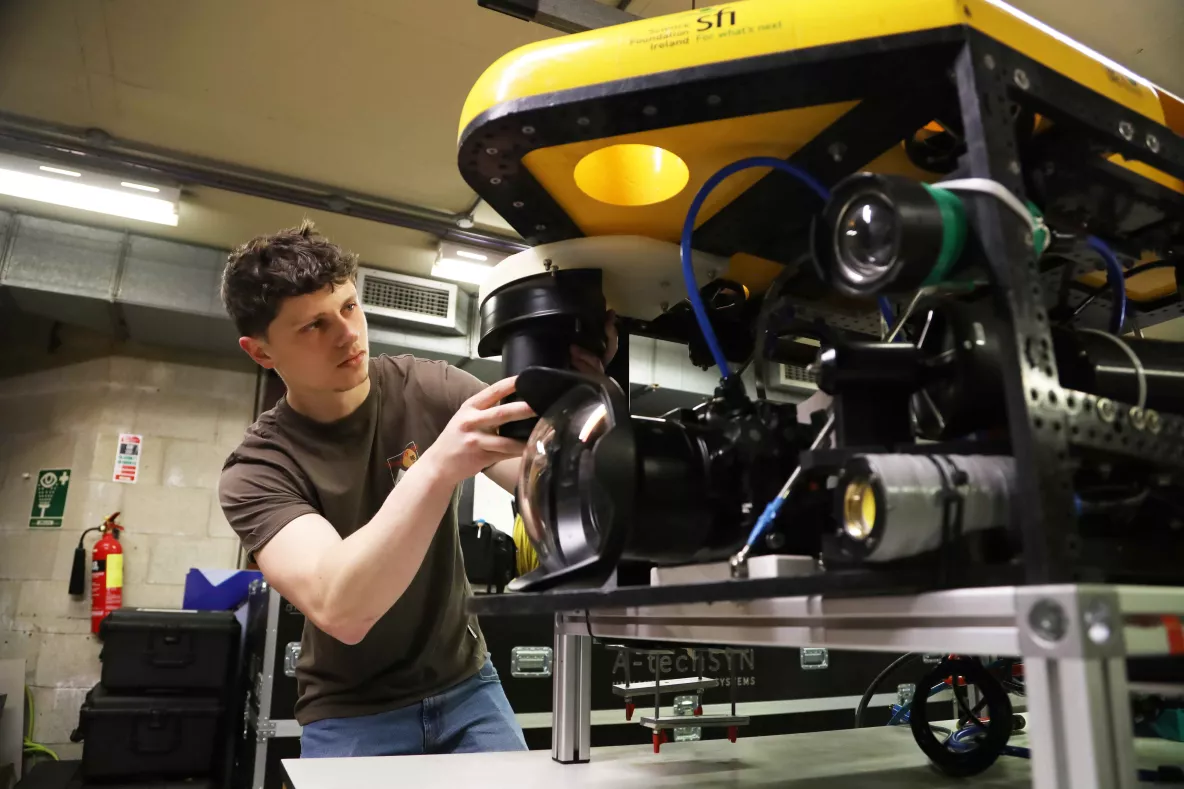

Electronic and Computer Engineering student Cullen Toal is participating in the summer research programme at the Faculty of Science and Engineering. We recently met with Cullen to ask about the programme and what he was investigating.
Course: BEng in Electronic and Computer Engineering
Supervisor: Dr Edin Omerdic
Name of Research Project/Activity: Multipoint Tether Management and Monitoring System (MTMMS) (TRIDENT project)
Why did you decide to study Electronic and Computer Engineering at UL?
I’ve always had a great interest in all things computers and electronics. When I was in secondary school, I built a fully functioning 8-bit calculator in Minecraft out of Redstone. I was fascinated with how the simple principle of an on/off switch representing a 1 or 0 powering my calculator was the same principle powering the real computer that was running the game. This sparked my interest in the inner workings of computers and technology in general, and thus when it came time to pick my course in university, ECE was a no-brainer.
What motivated you to apply for the Summer Research Programme?
I previously had the opportunity to work with the Centre for Robotics and Intelligent Systems (CRIS) at UL when I was in my first year at University through the Upstart programme and had a great experience working with the team. This motivated me to apply for the summer Bursary programme as I knew it would be an invaluable opportunity, and paired with my previous experience working with CRIS I figured I would already be up to speed with the day-to-day operations of the team.
What are you doing as part of your research here at UL?
The Trident project is an EU funded project for developing systems to monitor and predict the environmental impact of deep-sea mining operations. The Centre for Robotics and Intelligent Systems has proposed an RF (Resident Flyout) ROV, that would be housed on the deep-sea mining machinery, capable of inspecting the mining machinery and surrounding seabed. My research currently involves testing and integrating a Wideband Multibeam Sonar with one of the CRIS’ ROV’s. In contrast with single-beam sonars that emit a single acoustic signal, Wideband Multibeam Sonars emit acoustic signals in a fan shape that covers a much larger area of the seabed, allowing for the retrieval of high-resolution depth information of the seabed. Given the poor visibility conditions at the seabed, Wideband Multibeam Sonars will generate vital depth information, which will aid in monitoring the environmental impact of the mining operations.
What skills have you developed over the summer?
I have developed numerous practical and theoretical skills during my time with CRIS. Integrating instruments such as a wideband multibeam sonar with an ROV requires an understanding of global positioning systems, timing signals and the functioning of the instrument, all of which were completely new to me when I started my summer research with CRIS. As with most engineering work, the integration involved a huge amount of troubleshooting; testing sub-components, simulating signals with oscilloscopes, reprogramming a GPS antenna, and much more. Overall, this experience has taught me invaluable skills that will stand to me for the remainder of my time in University and beyond.
What has this experience taught you and what would you recommend it to others?
Working with the CRIS research team in UL has been an invaluable experience for me, and it has been a privilege to see how engineering research is applied at the cutting edge of sub-sea technology. While the Electronic and Computer Engineering course has provided me with a great theoretical background in many areas, there is no substitute for getting hands-on experience with real-world systems when developing your skills as an engineer, and I would thus highly recommend the summer research bursary to anyone who is interested.
What are your future career plans, would you consider a career in research?
While I don’t have any concrete plans at the moment, I would be open to pursuing a career in research.
Postal Address: Science & Engineering Faculty Office, Lonsdale Building, 1st Floor, University of Limerick, Limerick, Ireland
Email: scieng@ul.ie
Phone: +353 (0)61 202109 or +353 (0)61 202642